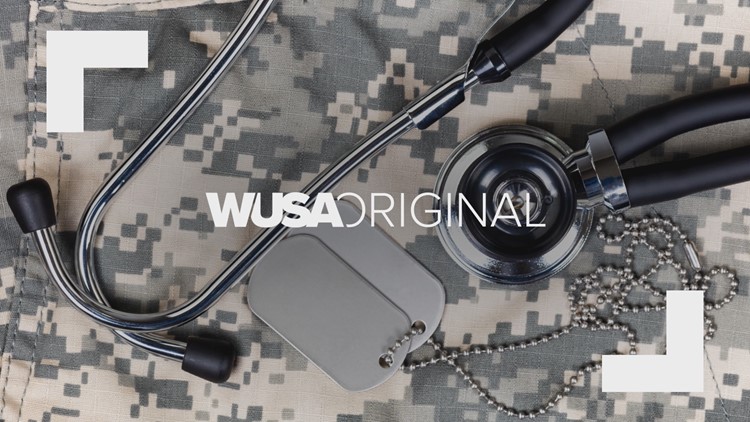WASHINGTON — WASHINGTON—In recent weeks, a WUSA9 investigation has focused on an anti-malarial drug called mefloquine.
Since the 1980s, tens of thousands of American service members have been ordered to take the drug. That included men and women who served in Somalia, Iraq and Afghanistan. It was intended to prevent malaria, a potentially fatal mosquito-borne disease. Pentagon officials say it is now used only as a drug of last resort.
Many veterans insist that small white pill destroyed their lives and abruptly ended their military careers. They blame mefloquine for everything from severe and permanent physical side effects, to gruesome, ongoing night terrors and other psychiatric issues.
Now, a new anti-malarial drug called tafenoquine is being fast-tracked for approval by the Food and Drug Administration, according to one of its developers. That’s raised some serious concerns among service members from as far away as Australia.
“It’s not neurotoxic and it is safe,” said Dr. Geoffrey Dow, the CEO and Founder of 60 Degrees Pharmaceuticals, or 60P. His company is seeking expedited FDA approval of tafenoquine here in the United States. Like mefloquine, it was created in the DC area, at the Walter Reed Army Institute of Research.
If tafenoquine is approved by the FDA, it could be administered to American service members at some point in the future, according to Dr. Dow.
“If you look at the evidence from 25 clinical studies, over 3,000 patients in rigorously conducted clinical trials, there is no evidence of neuropsychiatric adverse event risk,” said Dr. Stephen Toovey, a malaria expert and member of the scientific advisory board of 60P.
Roughly 10,000 miles away, many veterans of the Australian Defence Force beg to differ. Between 1998 and 2002, they were used for clinical trials of both made-in-America drugs, mefloquine and tafenoquine.
“While over in Timor, I was on the drug tafenoquine,” said Sgt. Andre Kerp, an Australian veteran. “And I was told there were no side effects, nothing wrong with it.”
Sgt. Kerp was one of 3,000 troops ordered to take one of the two anti-malarial drugs or, in some cases, both. The pills were administered on a weekly basis for at least six months, or for shorter periods at very high “loading” doses.
“I’m just a shadow of the person I once was. I was so happy, outgoing, loved fitness, loved the gym. And now I just stay home,” said Sgt. Kerp, whose medical records confirm he took tafenoquine only.
“I am so withdrawn from society. I’m not happy anymore. I have developed PTSD, I have very bad mood swings. I have now been diagnosed with depression, anxiety,” he said. “The side effects from taking that drug have greatly impacted my life.”
Veterans in Australia are caught in a bureaucratic quandary, just as they are here in the United States. Much like our Department of Veterans Affairs, the Australian government does not yet recognize a medical diagnosis directly related to either of these drugs.
“I’ve had spiraling mental health issues. I had suicide attempts. I’ve had anger management therapy. My biggest problem is coping with stress,” said Army Corporal Mick Kruizinga. Nearly two decades ago, he was ordered to take both drugs. So it’s difficult, if not impossible, to determine whether it was tafenoquine, mefloquine, a combination of both drugs, or something else that caused his severe, life-changing symptoms.
“My memory has suffered badly,” said Cpl. Kruizinga. “I repeat myself often. One time I told the same story to some family friends three times in the same evening. I’ve had tests for dementia but all returned negative.”
There are countless similar stories from other Australian veterans.
“People just haven’t been able to cope and they’ve taken their own lives,” said Major Stuart McCarthy, an Australian Army veteran who was ordered to take tafenoquine and mefloquine.
“I would rather live with malaria…which is treatable, than have to live with a permanent brain injury,” he said.
WUSA9 asked 60P CEO Dr. Geoffrey Dow if he would be willing to take the drug for at least six months, as the Australian service members did.
He responded, “The simple answer to that is yes” and added, “Without hesitation.”
“I think what we can clearly say is that tafenoquine is not behind what these unfortunate people might be suffering,” Dr. Toovey concluded. “Am I surprised that veterans have post traumatic stress disorder? No."
Drs. Toovey and Dow say military service, not anti-malarial drugs, caused the veterans’ psychiatric and physical conditions.
“We know post-traumatic stress disorder is a risk of deployment. It is a risk of military service,” asserted Dr. Toovey.
Echoed Dr. Dow, “It’s well documented in the literature that deployment specifically and then combat even more than that is a major risk factor for mental health disorders.”
Australian government documents obtained by WUSA9 reveal that 1,331 service members who took tafenoquine and deployed to the East Timor peacekeeping mission were later diagnosed with PTSD. That’s more than 1,300 veterans out of just five thousand military personnel, few of whom saw combat.
Tafenoquine and mefloquine are from the same broad class of drugs that have proven to be neurotoxic in animals. The term “neurotoxic” means the drug can cause adverse effects on the central nervous system and even permanent brain and brainstem damage. Symptoms of neurotoxicity can include: limb weakness or numbness, dizziness, memory loss, and mood and behavioral changes.
“The development of tafenoquine should be raising red flags all through the drug safety community,” said Dr. Remington Nevin. The former Army Medic founded the Quinism Foundation to study the potential side effects posed by these anti-malarial drugs and push for more research. He’s documented how many of the symptoms of toxicity mimic post-traumatic stress disorder, or PTSD.
“There’s been a systematic pattern of almost intentional ignorance among those in the military drug development community associated with this drug,” he said.
Dr. Nevin pointed out research done by Walter Reed’s own scientists in 2007 which revealed that “Tafenoquine is the only antimalarial more neurotoxic than mefloquine.”
Some experts disagree.
“Mefloquine and tafenoquine are very different drugs,” said Dr. Toovey. “Each has to be judged on its own merits.”
A 2010 study noted that “92% of tafenoquine subjects and 88% of mefloquine subjects” reported one or more adverse events. The majority of those side effects were described as mild or moderate in severity and included vertigo, diarrhea and abnormal dreams.
But what about the potential long-term effects of tafenoquine? In Australia, there is lingering concern among veterans that not enough research has been done.
Insisted Dr. Toovey, “We would not expect to see side effects emerging 20 years later. And nobody has gone and looked for that. It would be… it doesn’t make any sense scientifically.”
According to 60P’s Dr. Dow, tafenoquine could be approved by the United States Food and Drug Administration by the end of this year.
FDA officials won’t comment on pending applications, but emphasized that the agency would only approve a new drug after finding that it’s safe and effective.
Drugmaker Glaxo Smith Kline has developed a different variety of tafenoquine. Unlike the 60P version which is designed to prevent malaria, this would be a one-time dose intended to treat the disease. Company officials indicated it would not be marketed in the United States.
If you've taken tafenoquine and believe you suffered psychiatric or physical side effects as a result, we'd like to hear from you. Please email Andrea McCarren and put "Tafenoquine" in the subject line. Let us know when and where you took the drug, for how long and under what circumstances.
Other tafenoquine studies
In-Vitro Toxicity Assessment of Antimalarial Drugs on Cultured Embryonic Rat Neurons, Macrophage (RAW 264.7... by WUSA9 TV on Scribd
1951 - Schmidt, Schmidt - Neurotoxicity of the 8-Aminoquinolines. III. the Effects of Pentaquine, Isopentaq... by WUSA9 TV on Scribd
1949 - Schmidt, Schmidt - Neurotoxicity of the 8-Aminoquinolines. II. Reactions of Various Experimental Ani... by WUSA9 TV on Scribd
1948 - Schmidt, Schmidt - Neurotoxicity of the 8-Aminoquinolines. I. Lesions in the Central Nervous System... by WUSA9 TV on Scribd
Australian Government Department of Veterans' Affairs - Accepted Conditions for Veterans of Selected Confli... by WUSA9 TV on Scribd
Radical curative efficacy of tafenoquine combination regimens in Plasmodium cynomolgiinfected Rhesus monkey... by WUSA9 TV on Scribd



